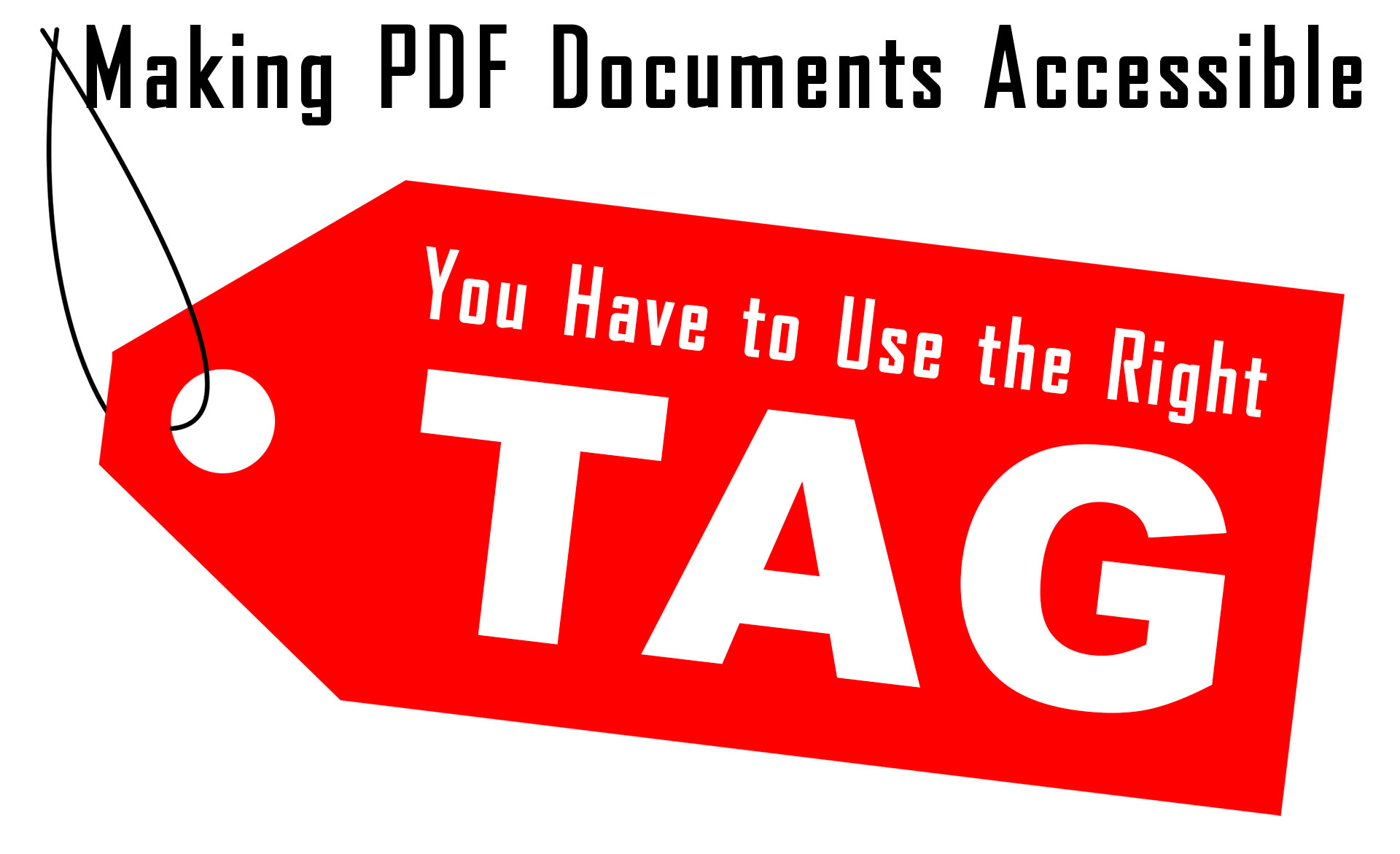
If you’re trying to make a PDF accessible, you have to understand tags. To be brief, tags are the objects that tell assistive technology how to present your information to people who cannot see it. Each tag identifies the type of content and what information is stored inside. There are hierarchical tags that build structure and their are content tags that hold… content. Tags are also the key to navigation in a PDF and provide a blueprint for people who cannot visually discern what’s in the document. The following is a short list of the various types of Tags and how they are used in PDF.
Hierarchical Tags
| Tag Name | Tag | Use | Parent Tag |
| Document | <Document> | Holds a complete document, should only be used once in a PDF | n/a |
| Part | <Part> | Major subdivision of a document | Document |
| Article | <Art> | Group of Content | Document, Part |
| Section | <Sect> | Section of Content | Document, Part, Art |
| Div | <Div> | Grouping element often used to indicate a common language for a group of tags, etcetera. | Document, Part, Art, Sect |
| Blockquote | <Blockquote> | One or more paragraphs quoted from another source. | Document, Part, Art, Sect |
Table of Contents and Index
| Tag Name | Tag | Use | Parent Tag |
| Table of Contents | <TOC> | Holds the Table of Contents in a document | Document, Part, Art, Sect |
| Table of Contents Entry | <TOCI> | Each entry in the Table of Contents should have its own TOCI tag. | <TOC> |
| Index | <Index> | The subject matter index. | Document, Part, Art, Sect |
Block Level Content
| Tag Name | Tag | Use | Parent Tag |
| Paragraph | <P> | Any text content. | Document, Part, Art, Sect, Div, BlockQuote, Caption, TOCI |
| Heading 1 | <H1> | Heading Level 1 | Document, Part, Art, Sect, Div, BlockQuote |
| Heading 2 | <H2> | Heading Level 2 | Document, Part, Art, Sect, Div, BlockQuote |
| Heading 3 | <H3> | Heading Level 3 | Document, Part, Art, Sect, Div, BlockQuote |
| Heading 4 | <H4> | Heading Level 4 | Document, Part, Art, Sect, Div, BlockQuote |
| Heading 5 | <H5> | Heading Level 5 | Document, Part, Art, Sect, Div, BlockQuote |
| Heading 6 | <H6> | Heading Level 6 | Document, Part, Art, Sect, Div, BlockQuote |
Lists
| Tag Name | Tag | Use | Parent Tag |
| List | <L> | Holds a list or group of lists | Document, Part, Art, Sect, Div, BlockQuote, Index |
| List Item | <LI> | One List Entry. | List |
| Label | <Lbl> | Contains the bullet or the number in a numbered list. Can be optional | List Item |
| List Body | <LBody> | The content of the list item, can contain child lists. | List Item |
Table
| Tag Name | Tag | Use | Parent Tag |
| Table | <Table> | Parent container for a table. | Document, Part, Art, Sect, Div, BlockQuote |
| Table Head | <THead> | Optional grouping of rows of header content in a Table. | Table |
| Table Body | <TBody> | Optional grouping of rows of body content in a Table. | Table |
| Table Footer | <TFoot> | Optional grouping of rows of footer content in a Table. | Table |
| Table Row | <TR> | A table row | Table, THead, TBody, TFoot |
| Table Header | <TH> | A cell of table header data. | TR |
| Table Data | <TD> | A cell of table data. | TR |
Inline Content
| Tag Name | Tag | Use | Parent |
| Span | <Span> | just about any kind of content that needs to be kept separate, either because of formatting, language or for alternate text. | P, H1 – H6, LBody, TD, Quote, Note |
| Quote | <Quote> | Similar to BlockQuote | P, H1 – H6, LBody, TD |
| Note | <Note> | Used for Footnotes and EndNotes. (This is for the actual content of the note, NOT the reference indicator.) | P, H1 – H6, LBody, TD |
| Reference | <Reference> | Container that refers to another location, most often used with footnotes and endnotes | P, H1 – H6, LBody, TD |
| Code | <Code> | Computer programming language. | P, H1 – H6, LBody, TD |
| Link | <Link> | Any hyperlink. Contains the LinkOBJR plus the text to be read. | P, H1 – H6, LBody, TD |
| Annotation | <Anot> | Annotations that aren’t a link. | P, H1 – H6, LBody, TD |
Non-Text Content
| Tag Name | Tag | Use | Parent |
| Figure | <Figure> | Any graphic or illustration. | P, H1 – H6, LBody, TD |
| Formula | <Formula> | Mathematical formula | P, H1 – H6, LBody, TD |
| Form | <Form> | Form element | P, H1 – H6, LBody, TD |



